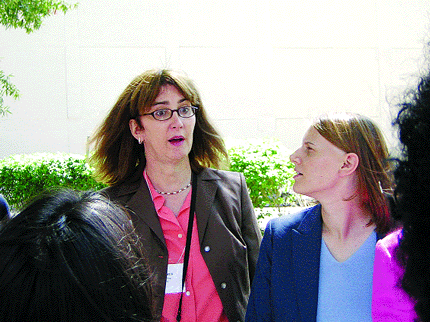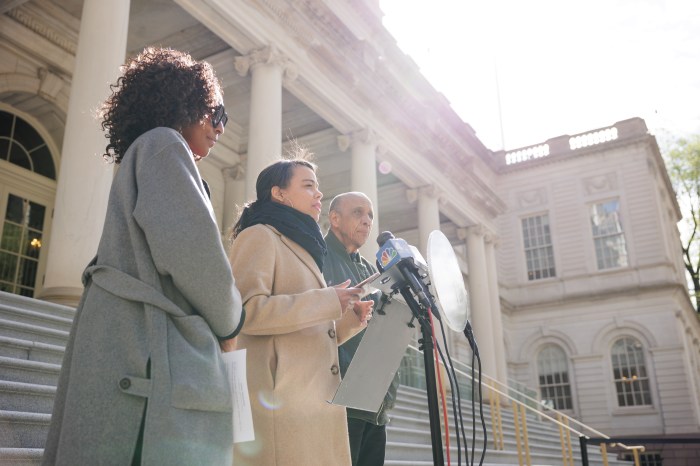Rare coalition including trans activists, Catholics oppose bill aimed at terrorists
On February 10, the U.S. House of Representatives passed the REAL ID Act, H.R. 418, in an attempt to make it more difficult for terrorists to enter and live in the United States.
Proponents say the measure is necessary to close loopholes exploited by the 9/11 hijackers. Transgender rights activists contend the measure places an unfair and discriminatory burden upon transgendered individuals, and is also a threat to privacy.
Among the provisions of the REAL ID Act is a federally mandated set of criteria that must be present on all state drivers licenses and identification cards for those documents to be accepted as proof of identity by the federal government. Such identity cards are, for example, required to board airplanes and enter government buildings. The transgender rights advocates are concerned about the provision requiring that gender be listed on a driver’s license or identity card.
“On a nationally regulated ID card, it might be harder to change gender markers,” said Mara Keisling, director of the National Center on Transgender Equality (NCTE).
Calling gender markers on driver’s licenses a hold-over from a time when non-picture licenses were issued, Keisling said such markers put transgendered people at risk for discrimination, job loss and violence.
“This is especially bad for people who can’t afford, don’t want or for health reasons can’t have surgery,” Keisling said.
The NCTE joined a diverse group of REAL ID opponents that includes the U.S. Conference of Catholic Bishops, Amnesty International, the Republican Liberty Caucus, Gun Owners of America and former Republican Georgia Rep. Bob Barr, the author of the 1996 Defense of Marriage Act, who is now a consultant with the American Civil Liberties Union.
The bill also calls for the linking of motor vehicle department databases among the states, potentially warehousing in a single place a person’s vital information, including name, social security number, birth date and address.
This bothers Keisling as well. Employers checking an employee’s identification could possibly learn details the employees doesn’t want revealed.
“To be outed at work if you are transgendered can be dangerous both financially and physically,” Keisling said.
Jeff Deist, spokesman for Rep. Ron Paul, a Texas Republican who voted against the REAL ID Act, called the driver’s license provisions a “proto-national” ID card program.
“Eventually, all IDs issued by states will have to follow the federal guidelines if they are to be used for such things as boarding an aircraft or proof of citizenship for getting a job,” he said.
Deist said Congressman Paul’s concern is that this information, especially in an age of greater data collation, might someday be linked with other databases containing more sensitive information.
“The problem is that no one can prove this will always be kept separate from other databases,” Deist explained. “Who knows what the bureaucracy will look like in 20 years? And since it’s based on Social Security numbers who’s to say it won’t just be your driving record that’s accessible?”
Keisling sees it the same way.
“Our medical information could out us as LGBT people,” Keisling said. “What if someone could find out you took regular HIV tests? Or had reassignment surgery?”
Critics say the REAL ID Act could force states to issue identification cards only to American citizens and legal immigrants and that it includes provisions that make it more difficult for immigrants to gain political or religious asylum in the U.S. The legislation specifically empowers the secretary of homeland security to waive any law that interferes with the construction of a fence along the border with Mexico.
Jim Sensenbrenner, a Wisconsin Republican, is the bill’s main sponsor. His spokesman, Jeff Lungren, noted that despite the varied opposition, a bipartisan majority voted for H.R. 418.
“Congressman Sensenbrenner views the driver’s license provisions as necessary to prevent another 9/11 by disrupting terrorist travel,” Lungren said. “The 9/11 Commission said documents are as important as weapons for terrorists.”
He noted that Mohammed Atta, alleged leader of the 9/11 terrorists, received a Florida driver’s license valid for six years based on a visa good for only six months, and that REAL ID was meant to correct such discrepancies.
But Perry Lange, a legislative expert with People for the American Way says making the local DMV responsible for policing immigration laws was an onerous and expensive burden most states were not capable of fulfilling.
“We’d rather have people licensed and trained to operate motor vehicles, instead of forcing them to drive illegally, and a potential danger to others,” he said.
Lange also said he expected the verification of the foundation documents individuals must use to obtain licenses could become more stringent under the REAL ID Act, and that this would make it harder for transgendered individuals to obtain licenses or ID cards. Many states will now be forced to change the documents and processes they use to issue licenses, he predicted, in turn forcing many transgendered people to redo the process of obtaining a license with their preferred gender. He said terrorists will simply forge such documents and only honest people will bear the hardship.
Rep. Jerrold Nadler, a Manhattan Democrat, said he opposed the REAL ID Act for several reasons.
“If it were to become law, it would not only place another barrier in front of transgendered people, but it is unfair to immigrants, contains horrible asylum standards and allows the secretary of homeland security to waive all laws—including murder—to build a fence along the border with Mexico,” Nadler said.
A similar bill is scheduled to be introduced in the Senate within the next two weeks.
Pres. George W. Bush has said if passed by Congress he will sign the legislation into law.
gaycitynews.com



































